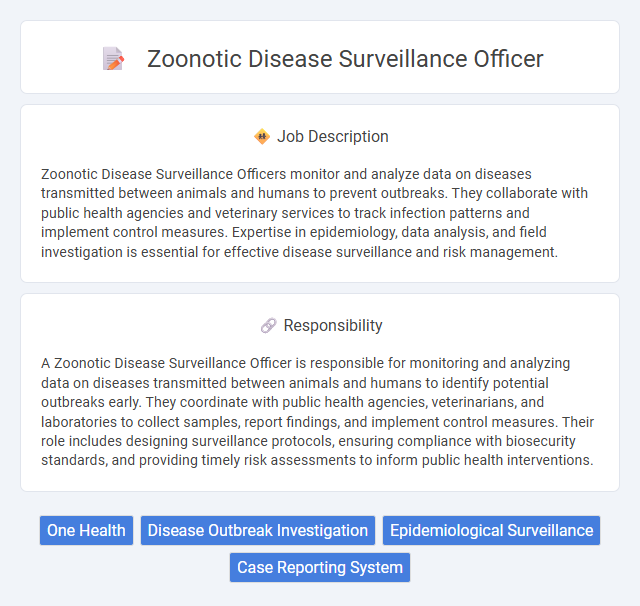
Zoonotic Disease Surveillance Officers monitor and analyze data on diseases transmitted between animals and humans to prevent outbreaks. They collaborate with public health agencies and veterinary services to track infection patterns and implement control measures. Expertise in epidemiology, data analysis, and field investigation is essential for effective disease surveillance and risk management.
Individuals with strong observational skills and a background in veterinary or public health are likely suitable for the role of a Zoonotic Disease Surveillance Officer. Those comfortable working in dynamic environments, often under pressure to identify and report disease outbreaks, may find this position fitting. People who prefer routine desk jobs without fieldwork might not align well with the demands of this role.
Qualification
A Zoonotic Disease Surveillance Officer typically holds a degree in veterinary science, public health, epidemiology, or a related field, often complemented by specialized training in infectious disease control and zoonoses. Proven experience in disease surveillance, data analysis, and outbreak investigation is essential, alongside proficiency in GIS mapping and reporting tools. Strong communication skills and knowledge of national and international health regulations enhance effectiveness in monitoring and preventing zoonotic disease transmission.
Responsibility
A Zoonotic Disease Surveillance Officer is responsible for monitoring and analyzing data on diseases transmitted between animals and humans to identify potential outbreaks early. They coordinate with public health agencies, veterinarians, and laboratories to collect samples, report findings, and implement control measures. Their role includes designing surveillance protocols, ensuring compliance with biosecurity standards, and providing timely risk assessments to inform public health interventions.
Benefit
Zoonotic Disease Surveillance Officers likely improve public health by monitoring and identifying diseases that transfer from animals to humans, enabling timely interventions. Their role may reduce outbreak risks, protecting communities and healthcare systems from potentially severe impacts. The position probably offers opportunities for professional growth within epidemiology and public health sectors.
Challenge
Zoonotic Disease Surveillance Officers likely face challenges due to the complexity of tracking diseases that jump between animals and humans, which requires precise data collection and interpretation under unpredictable conditions. There is a probable difficulty in managing timely responses to outbreaks, compounded by limited resources and the need for coordination across multiple agencies. This role may demand constant adaptation to evolving pathogens and varying environmental factors, increasing the potential for operational challenges.
Career Advancement
Zoonotic Disease Surveillance Officers play a crucial role in monitoring and controlling diseases transmitted from animals to humans, with career advancement opportunities expanding into epidemiology, public health policy, and infectious disease research. Professionals can progress to senior surveillance roles or specialize in data analysis, outbreak investigation, and risk assessment within governmental and global health organizations. Continuous training in genomic epidemiology and One Health approaches enhances prospects for leadership positions and collaboration with interdisciplinary teams.
Key Terms
One Health
A Zoonotic Disease Surveillance Officer plays a critical role in monitoring and controlling diseases that transmit between animals and humans, integrating multidisciplinary approaches under the One Health framework. This role involves collecting, analyzing, and reporting epidemiological data to identify emerging zoonotic threats and coordinate responses across veterinary, medical, and environmental sectors. Effective collaboration enhances early detection and prevention strategies, reducing the impact of zoonoses on public health and ecosystems.
Disease Outbreak Investigation
Zoonotic Disease Surveillance Officers specialize in detecting and investigating outbreaks of zoonotic diseases that transfer from animals to humans. They collect and analyze epidemiological data to identify sources, transmission patterns, and at-risk populations, enabling targeted control measures. Their work supports early warning systems and public health responses to prevent widespread outbreaks.
Epidemiological Surveillance
A Zoonotic Disease Surveillance Officer specializes in monitoring and analyzing data related to zoonotic infections, which are diseases transmitted between animals and humans. They conduct epidemiological surveillance by collecting field data, identifying outbreak patterns, and evaluating transmission dynamics to inform public health interventions. Their role is critical in early detection, risk assessment, and controlling zoonotic disease spread to prevent potential epidemics.
Case Reporting System
A Zoonotic Disease Surveillance Officer manages the Case Reporting System to track and analyze occurrences of diseases transmitted from animals to humans. This role ensures timely data collection, validation, and reporting to support outbreak detection and public health interventions. Proficiency in digital health information systems and collaboration with veterinary and human health sectors is critical for effective disease monitoring and response.
 kuljobs.com
kuljobs.com